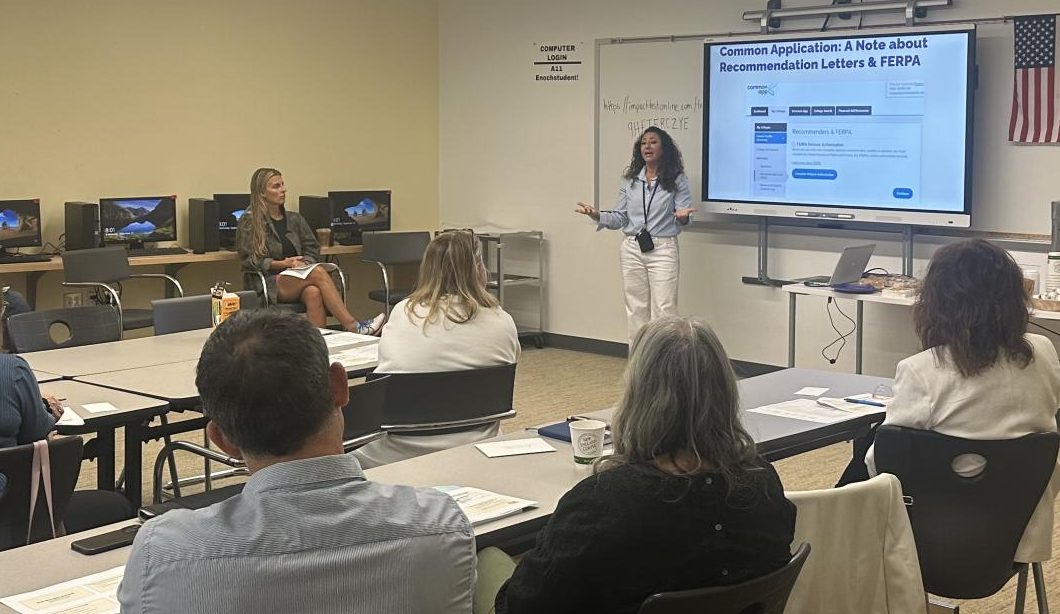The Pawprint sat down with beloved guidance counselor, Mrs. Zdunczyk to learn about her, her family, and her career at Morgan.
What does it mean to be a school counselor?
There are three components a counselor provides students here at Morgan – social emotion help, career and post secondary guidance, and academic structure.
The first part of their job, and potentially the most important, is working with kids on their social emotional skills. “That could be anything from, you know, providing as needed, like a quick 10 minute, 15-minute individual sessions to like regular check-ins and having contact with an outside therapist,” Zdunczyk said.
Some other things that counselors have to do that people might not already realize are having individual meetings with everyone – such as a Junior Planning meeting, or working with students who might not have the help at home. Also, counselors help with things that students struggle with by themselves, such as filling out FAFSA.
“For some students, I’m going to follow up, you know, two, three, four times if I need to, to make sure that they’re getting the content and there are certain things that maybe they can’t navigate by themselves,” said Zdunczyk.
That is not all, though. Zdunczyk helps students academically by helping clean out their bags, making graphic organizers, going over PowerSchool and also focusing on what she calls, “executive functioning.”
“We make these outward routines and almost like cheat sheets for life, but for academics,” said Zdunczyk. “That was a long answer. I apologize,” she joked.

How does she manage time between her home life and her work life?
Zduncyk loves working with students to figure out what’s wrong and make them feel better. However, as a counselor, students reach out to her in need of help; often, they will email her over the weekend or during break. Although she wants to always be available for her students, she finds it hard to balance her school life and her home life as a mom of Mila (4) and Elle (2).
Zdunczyk often has to take work home because she loves her students so much, and she likes to keep her email open just in case something happens to a student, but it comes at a cost.
“[During the weekend] If I get an email, it’s like, don’t look at your email, Mrs. Zdunczyk; but it’s hard, and you guys need things, and it’s really hard to shut it off. Like, if I see a student outside, right? And, it’s just hard to, you know, shut off Mrs. Zdunczyk because I am a human and I do have a family and I want to make them a priority, but, you know, it’s hard to get all of the things that you guys need done within the time frame that I’m here.
Although Zdunczyk wants to help her students, she also has two kids and a husband, and she needs to manage her time between work and her family
What is a lesson Mrs. Zdunczyk has learned being a school counselor?
Zdunczyk had a situation with a student and a teacher several years back that she reflected on. The student initially wanted to take all advanced classes, but was already experiencing a lot of stress – so she decided to not take all of them; instead she signed up for a level 1 course. However, the teacher who assigned her all honors was frustrated.
The teacher believed it was a bad idea because they believed the student was capable of taking all honors classes. She believed in her. The teacher was sad that the student didn’t want to take that honors class that she had suggested.
At the time, Zdunczyk was younger. Zduncyck remembers that her and the teacher got into a heated conversation discussing the student’s future.
“And as soon as I brought this student into the conversation, the teacher got it, and it was just a good experience, and it doesn’t always go that way. For instance, I recall a similar experience at a school before this, when I was interning. I didn’t always end on a good note with teachers. I’ve been very fortunate here that we can always get to a positive place, but, yeah, I mean, it was intimidating because this teacher had a lot of experience, and they were well respected.”
Zdunczyk learned the importance of always bringing people into the conversation, so they can all discuss what they are thinking.



